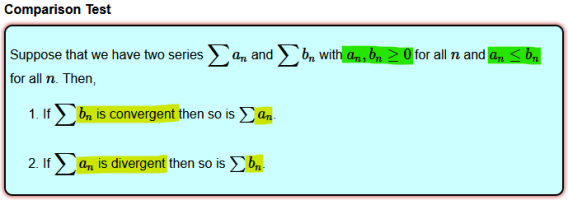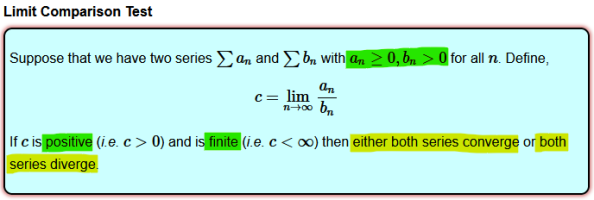While I was analyzing and solving some infinite series, I came across these two series.
[math]\sum_{n=1}^{\infty}\frac{1}{n}[/math]
[math]\sum_{n=1}^{\infty}(-1)^{n}\frac{1}{n}[/math]
The first series is known to diverge but the second series counterintuitively converges. You as experts may say there's no counterintuitiveness behind the convergence, just apply the alternating series test.
[math]\frac{1}{n + 1} \leq \frac{1}{n}[/math]
[math]\frac{n}{n + 1} \leq 1[/math]
It's clear to me this inequality is true for all [imath]n \geq 1[/imath]. Today I accidently applied the limit comparison test on the alternating series and found that it diverges. Why the alternating series test is stronger than the limit comparison test in this situation? I mean by this why the limit comparison test doesn't count.
[math]\sum_{n=1}^{\infty}\frac{1}{n}[/math]
[math]\sum_{n=1}^{\infty}(-1)^{n}\frac{1}{n}[/math]
The first series is known to diverge but the second series counterintuitively converges. You as experts may say there's no counterintuitiveness behind the convergence, just apply the alternating series test.
[math]\frac{1}{n + 1} \leq \frac{1}{n}[/math]
[math]\frac{n}{n + 1} \leq 1[/math]
It's clear to me this inequality is true for all [imath]n \geq 1[/imath]. Today I accidently applied the limit comparison test on the alternating series and found that it diverges. Why the alternating series test is stronger than the limit comparison test in this situation? I mean by this why the limit comparison test doesn't count.



